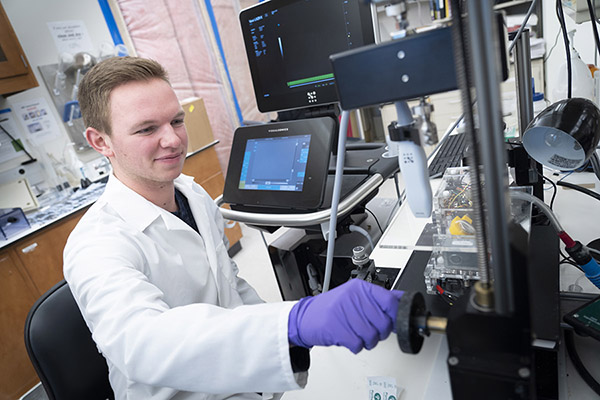Leslie Bottorff Fellow Luke Schepers
Leslie Bottorff Fellow Luke Schepers
PhD Student Finds Vast Potential in Meeting People, Meeting Needs
The Biomedical Engineering Ph.D. program is proving to be a launchpad for Luke Schepers, whose research into diabetes and cardiovascular disease will benefit from a unique combination of academic resources while he makes plans for an entrepreneurial career. An undergraduate degree in mechanical engineering was a first step toward his current exploration of medical practitioners' needs and his deeper education in life sciences and the everyday realities of patient care. His receipt of a Leslie Bottorff Fellowship during this first year of his studies has added to a potent mix of opportunities.

Purdue's Weldon School of Biomedical Engineering, which directs the Ph.D. program in partnership with Indiana University School of Medicine, will provide the home base for Schepers. Its Cardiovascular Imaging Research Laboratory (CVIRL), a center for technology to improve detection and treatment of many medical conditions, has assigned him to engineering projects while he also tackles science coursework as a Bioengineering Interdisciplinary Training for Diabetes Research (BTDR) Program Fellow. Weldon faculty member Craig Goergen, Ph.D., director of CVIRL, is serving as his official mentor.
Meanwhile, Schepers is continuing collaborations with co-advisor Jonathan Tune, Ph.D., an IU School of Medicine faculty member and an investigator with the school's Center for Diabetes and Metabolic Diseases. Previous summers spent assisting Tune planted biomedical inclinations in the mind of the mechanical-engineering undergraduate. Other IU School of Medicine faculty members-Jeffrey Everett, M.D.; Pantila Bateman, M.D.; and Kieren Mather, M.D.-are serving as clinical mentors for Schepers, who has already begun visiting hospitals and shadowing physicians.
Those activities constitute a crucial part of the Ph.D. program. Over the next several years, he will meet with diabetes patients to learn firsthand the challenges they face in managing the disease. One of the most obvious burdens is regular monitoring of blood glucose levels.
"I like seeing a clinical need as a goal for my research," Schepers says. "It can drive what questions you ask and give your research a purpose." He anticipates his encounters with practitioners and patients will guide him toward a thesis project aiming to develop technologies and devices translatable in diabetic patients daily lives. A special area of attention is their risk from heart attack and stroke, which are the leading causes of death among people with type 2 diabetes.
The Bottorff Fellowship, spanning two years, will defray costs of travel for clinical observation and for conferences with a clinical focus. Schepers has already attended a "diabetes immersion day" at IU School of medicine, and he plans to attend Scientific Sessions soon where he will connect with clinicians from the American Heart Association.
The need for innovations addressing cardiovascular disease and diabetes has strengthened his already visible entrepreneurial spirit. As an undergraduate, he co-founded a company with two classmates. During the summer of 2019, he worked for a young biotech company and learned lessons about the dynamics of startups.
Entrepreneurship and Ph.D. research will go hand-in-hand. "There's a lot of space for development of devices" that are user-friendly for clinicians and patients alike, he says. Some devices may be for monitoring, others for disease management, some may be implantable, others for occasional, external use.
With an eye on career prospects in the private sector, Schepers wants to tap into another Purdue resource when the time is right. The university's Krannert School of Management has partnered with the Weldon School and IU School of Medicine to offer a graduate-level certificate program called Biomedship (a contraction of Biomedical Entrepreneurship and Innovation). Its stated mission is "to produce the next generation of leaders in biomedical innovation and management." Schepers says he's eager to learn "what it takes to bring a device to market."
Currently, marketplace allures take a back seat to Ph.D. pursuits and campus activities. With research, coursework, and clinical observation consuming much of his time, Schepers says he still looks for new opportunities in such an interdisciplinary, entrepreneurial place. As a sports fan, he's enjoying his first season of Purdue football.